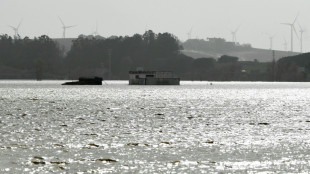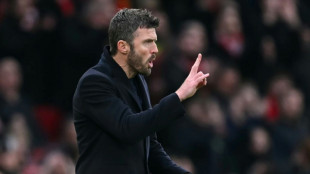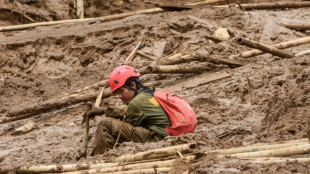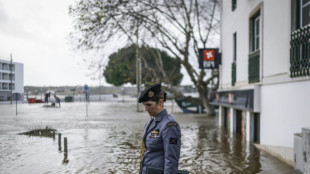
-
 Ice dancers Chock and Bates shine as US lead Japan in team event
Ice dancers Chock and Bates shine as US lead Japan in team event
-
Stellantis takes massive hit on 'overestimation' of EV demand

-
 Stocks rebound though tech stocks still suffer
Stocks rebound though tech stocks still suffer
-
Spanish PM urges caution as fresh rain heads for flood zone

-
 Iran says to hold more talks with US despite Trump military threats
Iran says to hold more talks with US despite Trump military threats
-
Russia accuses Kyiv of gun attack on army general in Moscow

-
 Cambodia reveals damage to UNESCO-listed temple after Thailand clashes
Cambodia reveals damage to UNESCO-listed temple after Thailand clashes
-
Norway crown princess 'deeply regrets' Epstein friendship

-
 Italy set for Winter Olympics opening ceremony as Vonn passes test
Italy set for Winter Olympics opening ceremony as Vonn passes test
-
England's Jacks says players back under-fire skipper Brook '100 percent'

-
 Carrick relishing Frank reunion as Man Utd host Spurs
Carrick relishing Frank reunion as Man Utd host Spurs
-
Farrell keeps the faith in Irish still being at rugby's top table

-
 Meloni, Vance hail 'shared values' amid pre-Olympic protests
Meloni, Vance hail 'shared values' amid pre-Olympic protests
-
Olympic freestyle champion Gremaud says passion for skiing carried her through dark times

-
 US urges new three-way nuclear deal with Russia and China
US urges new three-way nuclear deal with Russia and China
-
Indonesia landslide death toll rises to 74

-
 Hemetsberger a 'happy psychopath' after final downhill training
Hemetsberger a 'happy psychopath' after final downhill training
-
Suicide blast at Islamabad mosque kills at least 31, wounds over 130

-
 Elton John accuses UK tabloids publisher of 'abhorrent' privacy breaches
Elton John accuses UK tabloids publisher of 'abhorrent' privacy breaches
-
Lindsey Vonn completes first downhill training run at Winter Olympics

-
 Digital euro delay could leave Europe vulnerable, ECB warns
Digital euro delay could leave Europe vulnerable, ECB warns
-
Feyi-Waboso out of England's Six Nations opener against Wales

-
 Newcastle manager Howe pleads for Woltemade patience
Newcastle manager Howe pleads for Woltemade patience
-
German exports to US plunge as tariffs exact heavy cost

-
 Portugal heads for presidential vote, fretting over storms and far-right
Portugal heads for presidential vote, fretting over storms and far-right
-
Suicide blast at Islamabad mosque kills at least 30, wounds over 130: police

-
 Russia says Kyiv behind Moscow shooting of army general
Russia says Kyiv behind Moscow shooting of army general
-
Greenland villagers focus on 'normal life' amid stress of US threat

-
 Iran, US hold talks in Oman after Trump military threats
Iran, US hold talks in Oman after Trump military threats
-
Stocks waver as tech worries build

-
 Dupont, Jalibert click to give France extra spark in Six Nations bid
Dupont, Jalibert click to give France extra spark in Six Nations bid
-
'Excited' Scots out to prove they deserve T20 World Cup call-up

-
 EU tells TikTok to change 'addictive' design
EU tells TikTok to change 'addictive' design
-
India captain admits 'there will be nerves' at home T20 World Cup

-
 Stellantis takes massive hit for 'overestimation' of EV shift
Stellantis takes massive hit for 'overestimation' of EV shift
-
'Mona's Eyes': how an obscure French art historian swept the globe

-
 Iran, US hold talks in Oman
Iran, US hold talks in Oman
-
Iran, US hold talks in Oman after deadly protest crackdown

-
 In Finland's forests, soldiers re-learn how to lay anti-personnel mines
In Finland's forests, soldiers re-learn how to lay anti-personnel mines
-
Israeli president visits Australia after Bondi Beach attack

-
 In Dakar fishing village, surfing entices girls back to school
In Dakar fishing village, surfing entices girls back to school
-
Lakers rally to beat Sixers despite Doncic injury

-
 Russian pensioners turn to soup kitchen as war economy stutters
Russian pensioners turn to soup kitchen as war economy stutters
-
Japan taps Meta to help search for abuse of Olympic athletes

-
 As Estonia schools phase out Russian, many families struggle
As Estonia schools phase out Russian, many families struggle
-
Toyota names new CEO, hikes profit forecasts

-
 Next in Putin's sights? Estonia town stuck between two worlds
Next in Putin's sights? Estonia town stuck between two worlds
-
Family of US news anchor's missing mother renews plea to kidnappers

-
 Spin woes, injury and poor form dog Australia for T20 World Cup
Spin woes, injury and poor form dog Australia for T20 World Cup
-
Japan's Liberal Democratic Party: an election bulldozer


Courtrooms: a growing arena in the climate fight
The battle against climate change is increasingly being fought in the courtroom, as national governments, specific laws and individual companies are targeted for their roles in the crisis.
The cases have sometimes resulted in successfully influencing policy -- an outcome hoped for by the six Portuguese youths who have lodged a case against 32 countries at the European Court of Human Rights (ECHR), accusing the governments of moving too slowly.
Here is some key background and analyst commentary on climate lawsuits around the world:
- An explosion of lawsuits -
The number of court cases linked to climate change doubled between 2017 and 2022, according to the UN Environment Programme and Columbia University's Sabin Center for Climate Change Law.
There were more than 2,500 cases lodged worldwide as of mid-September, a Sabin Center tracker showed, with more than 1,600 in the United States.
Of the cases worldwide, 135 were brought in developing countries, including Small Island Developing States -- far-flung nations whose land is some of the most at-risk from climate change.
"Why is climate litigation still growing? Because the climate crisis is increasing in its intensity, its immediacy," Michael Burger, executive director of the Sabin Center, told AFP.
"And because government and corporate action is inadequate to meet the moment."
The number of cases being filed appears to have slowed over the past year, though it's still too early to tell for sure, according to the latest report from the Grantham Research Institute on Climate Change in London.
- Effectiveness -
Climate change litigation has affected the "outcome and ambition of climate governance," experts from the UN's Intergovernmental Panel on Climate Change (IPCC) wrote in a report last year, adding that successful cases also serve as a form of external pressure on governments.
Urgenda, an environmental organization in the Netherlands, notched a notable win at the Dutch Supreme Court in 2019, with justices ordering the government to reduce its greenhouse gas emissions by 25 percent by the end of the following year.
Government policies "that are explicitly linked to the case" were subsequently introduced, said Catherine Higham, a Grantham Research Institute policy fellow.
- Litigation 'cuts both ways' -
But a number of high-profile cases have been unsuccessful, and those seeking a greener future aren't the only ones filing lawsuits: high-emitting companies are starting to file suit against climate-friendly laws they don't like.
"Litigation cuts both ways," says Higham.
"Those that benefit from the status quo will do what they can to preserve their benefits, and that will include going to court," added Burger.
Additionally, activists can find themselves in the crosshairs of suits linked to disruptive protests, though "judges have generally taken the climate crisis" as well as the role of civil disobedience "into consideration in sentencing," according to a report from the UN Environment Programme.
- Companies targeted -
In addition to governments, companies themselves can also be the target of lawsuits, with litigants pressing for both compensation and a change in corporate behavior.
In another historic Dutch decision, Shell was ordered in 2021 to reduce its CO2 emissions by 45 percent by 2023 -- a decision the oil major is appealing.
A new strategy employed by climate change activists is to target "greenwashing," accusing companies or organizations of deceptive practices concealing their true environmental footprint.
FIFA is among those that have been accused of the practice.
- Stronger data -
Scientists are increasingly able to establish the links between climate change and individual extreme weather events, as well as the role of specific high-emitting industries, from oil extraction to mining to cement production, in climate change -- data that is often used in lawsuits.
A county in the northwestern US state of Oregon filed suit in June against multiple international oil majors, seeking $51 billion in damages after a deadly "heat dome" blanketed the northwest of the country in 2021.
- Human rights -
Human rights also take center stage in some cases, often concerning people's rights to health and well-being or to a clean environment.
These sorts of arguments are often made in cases before international tribunals, like the ECHR.
- Non-binding, but influential -
Even when decisions are non-binding, they can influence government attitudes and policies worldwide.
Activists are currently awaiting advisory opinions from the International Court of Justice and the International Tribunal for the Law of the Sea on the obligations of individual states in climate matters.
"Although such opinions are non-binding, they have great potential to shape the future development of climate change law," according to the Grantham Research Institute.
L.AbuTayeh--SF-PST




